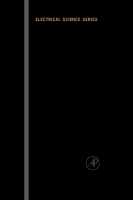Browse content
Table of contents
Actions for selected chapters
- Full text access
- Book chapterNo access
ALGEBRAIC FOUNDATIONS FOR AUTOMATA THEORY
FRANZ HOHN
Pages 1-34 - Book chapterNo access
AN INTRODUCTION TO REGULAR EXPRESSIONS
ROBERT MCNAUGHTON
Pages 35-54 - Book chapterNo access
STOCHASTIC AUTOMATA AND DISCRETE SYSTEMS THEORY
JULIUS T. TOU
Pages 55-80 - Book chapterNo access
SWITCHING NETWORKS AS MODELS OF DISCRETE STOCHASTIC PROCESSES
JOHN N. WARFIELD
Pages 81-123 - Book chapterNo access
APPLICATIONS OF AUTOMATA THEORY IN CODING
JAMES L. MASSEY
Pages 125-146 - Book chapterNo access
CONTENT ADDRESSABLE AND DISTRIBUTED LOGIC MEMORIES
CHESTER LEE
Pages 147-170 - Book chapterNo access
RECURSIVE FUNCTIONS AND SWITCHING-CIRCUIT THEORY
ROBERT S. LEDLEY
Pages 171-215 - Book chapterNo access
SYNTHESIS OF A CELLULAR COMPUTER
CHESTER LEE
Pages 217-234 - Book chapterNo access
FUNDAMENTALS OF THRESHOLD LOGIC
R.O. WINDER
Pages 235-318 - Book chapterNo access
AUTHOR INDEX
Pages 319-322 - Book chapterNo access
SUBJECT INDEX
Pages 323-330
About the book
Description
Applied Automata Theory provides an engineering style of presentation of some of the applied work in the field of automata theory. Topics covered range from algebraic foundations and recursive functions to regular expressions, threshold logic, and switching circuits. Coding problems and stochastic processes are also discussed, along with content addressable memories, probabilistic reliability, and Turing machines. Much emphasis is placed on engineering applications. Comprised of nine chapters, this book first deals with the algebraic foundations of automata theory, focusing on concepts such as semigroups, groups and homomorphisms, and partially ordered sets and lattices, as well as congruences and other relations. The reader is then introduced to regular expressions; stochastic automata and discrete systems theory; and switching networks as models of discrete stochastic processes. Subsequent chapters explore applications of automata theory in coding; content addressable and distributed logic memories; recursive functions and switching-circuit theory; and synthesis of a cellular computer. The book concludes with an assessment of the fundamentals of threshold logic. This monograph is intended for graduates or advanced undergraduates taking a course in information science or a course on discrete systems in modern engineering curriculum.
Applied Automata Theory provides an engineering style of presentation of some of the applied work in the field of automata theory. Topics covered range from algebraic foundations and recursive functions to regular expressions, threshold logic, and switching circuits. Coding problems and stochastic processes are also discussed, along with content addressable memories, probabilistic reliability, and Turing machines. Much emphasis is placed on engineering applications. Comprised of nine chapters, this book first deals with the algebraic foundations of automata theory, focusing on concepts such as semigroups, groups and homomorphisms, and partially ordered sets and lattices, as well as congruences and other relations. The reader is then introduced to regular expressions; stochastic automata and discrete systems theory; and switching networks as models of discrete stochastic processes. Subsequent chapters explore applications of automata theory in coding; content addressable and distributed logic memories; recursive functions and switching-circuit theory; and synthesis of a cellular computer. The book concludes with an assessment of the fundamentals of threshold logic. This monograph is intended for graduates or advanced undergraduates taking a course in information science or a course on discrete systems in modern engineering curriculum.
Details
ISBN
978-1-4832-0016-3
Language
English
Published
1968
Copyright
Copyright © 1968 Elsevier Inc. All rights reserved.
Imprint
Academic Press
